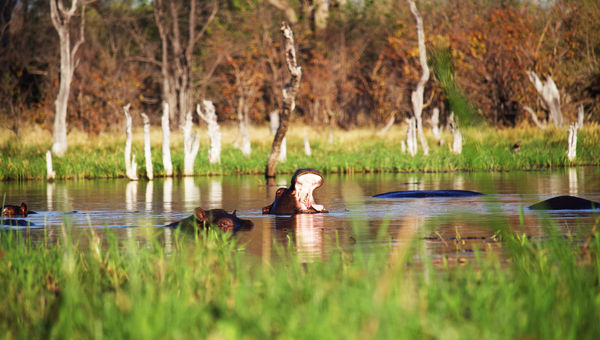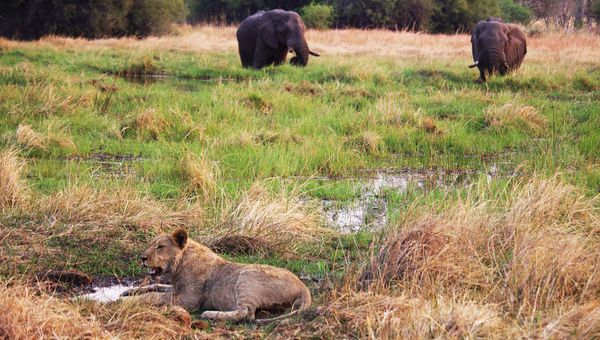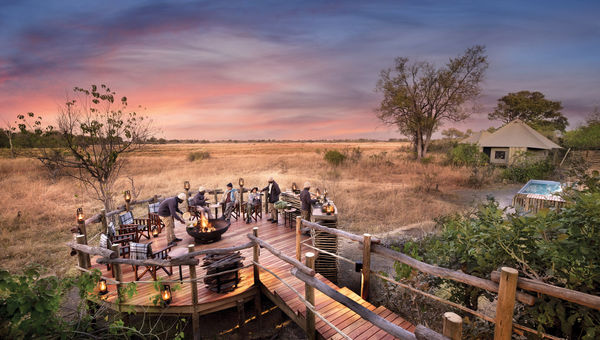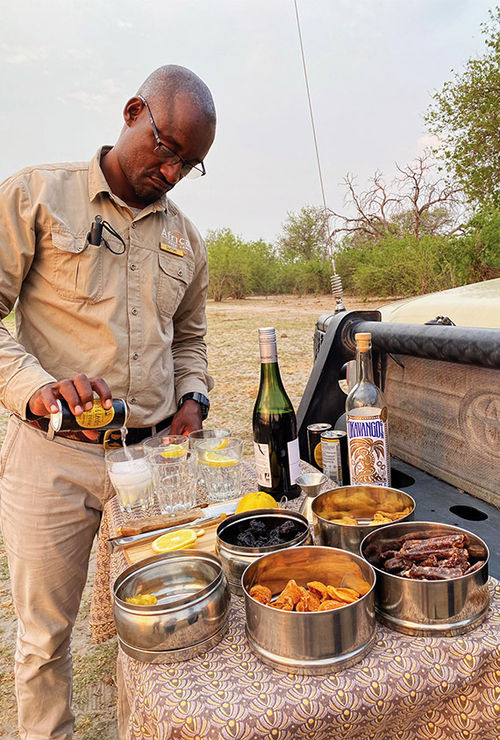The narrative of luxury tourism in Africa is undergoing a significant shift. The continent has gone from opulent and timeless luxury to experiential and barefoot luxury.
In my recent experience at African Bush Camps, luxury in their Botswana camps is about impact — impact on conservation, on the community and on life experience.
From the moment I set foot in African Bush Camps’ newest facility, Khwai Lediba, I felt close to Africa. There is a simplicity in the setup and the decor that conveys a feeling of tranquility and relaxation. The luxury is subtle and shines through in the camp’s considered touches as well as the warmth of the hosts and the rangers.
Situated in the Khwai Concession next to Moremi National Park, Khwai Lediba offers an opportunity to experience a simpler life, to feel grounded and one with nature. African Bush Camps’ Botswana facilities are unfenced, which means that the wildlife comes quite literally to your doorstep (or rather, your tent opening). On my first day, an elephant was standing on the sandy path to my tent, happily chomping on some leaves. On my last day in Botswana, at the company’s Linyanti Bush Camp, a lion visited me at night; its paw prints could be found all around my tent in the morning.

The tents at Khwai Lediba and Linyanti Bush Camp strike just the right balance between authenticity and luxury. They are charmingly unpretentious and allow guests to have an immersive wilderness experience complemented by those small, luxurious touches that make a stay both comfortable and unforgettable.
As soon as I walked into my tents, I was wowed by the incredible views of the African wilderness. Lying back on my comfortable four-poster bed, I got to see elephants walking by, hear rhinos grunting in the distance and admire incredible birds until the sun set.
The sensory journey extends to the bathroom experience. At Khwai Lediba, guests have the option of both an indoor and an outdoor shower. Nothing quite beats waking up for the day by taking a refreshing shower, the cool breeze whispering against your skin as you overlook the wilderness.
Linyanti, while offering only an indoor shower, compensates with a massive window that frames the African plains, turning every bath time into a wilderness experience.

Much to do
In the safari camps, guides offered many unique ways to fill the days. Dutch, my guide at Khwai Lediba, and Chester, my guide at Linyanti, each afternoon discussed what I wanted to do the next day: game drives, helicopter flights, mokoro canoe rides, nature walks. They introduced me to the best options for the day, making the experience seamless and mind-blowing.
It’s hard to pinpoint what my favorite wildlife experience was. Although I was terrified at the prospect of a helicopter flight, the experience was unlike one I had ever had before. Watching the waterways of the Okavango from above and admiring the elephants, it was easy to forget any nervous jitters.
I loved hearing lions contact calling on the night game drives, witnessing a cheetah devour her freshly caught kill and stumbling upon hyena cubs. I felt truly part of nature when Chester asked us to crouch and make ourselves small as an elephant walked past us on our game walk. And I can’t even begin to describe the feeling of gliding soundlessly through the water on a mokoro while seeing animals quenching their thirst by the water’s edge.
On each of these adventures, Dutch and Chester enriched the experience through their storytelling and their vast knowledge of wildlife and ecosystems — as well as their personal experiences growing up in this beautiful part of the world.

Combating ‘green fatigue’
While “green fatigue” can sometimes grip travelers, making them feel the plight of the world on their shoulders during their vacation, the focus on sustainability at African Bush Camps feels effortless.
Even though the camps are completely off the grid and run on solar power, this doesn’t negatively affect the travel experience. Sure, WiFi might be patchy. But whereas everyone was huddled together in the common WiFi lounge on the first day to read emails or send WhatsApp messages, by the second day most of us had embraced the simplicity and peace that comes with limited connectivity.
But sustainability goes further than just being off the grid at African Bush Camps. Throughout the bush camps and lodges, the team (from the guides to the chefs and the hosts) is passionate about upholding the camps’ values. They are all inspired by their founder Beks Ndlovu’s vision of conservation, education and community empowerment.

A place in the community
To help shape the narrative for the future of the surrounding communities, African Bush Camps is starting with the youngest residents. On one nature walk, Dutch took us to the local school, where the kids’ faces lit up when they saw him. He said that whenever he has a free day, he can be found at the school, teaching the kids about wildlife and conservation.
“It’s important to share a love for wildlife with the kids from the time they are young,” he said. “It’s the only way to help fight human-wildlife conflict.”
Although we spent our time at the school playing, singing and dancing with the kids, it is possible to be a lot more hands-on. African Bush Camps introduced a concept of “impact safaris” that enable travelers to get as involved as they want with the various local projects. Whether guests want to help repaint classrooms, teach English or even have their own kids spend a morning at a local school, there are many opportunities for travelers to get actively involved.
